stories, novels, diaries
Beginners should start with the short stories of Franz Kafka before tackling his novels. Be prepared for writing which can be very philosophical, heavily symbolic, and full of strange images. In Franz Kafka’s greatest works there is often no plot or dramatic tension, but the prose style (even in translation) is truly original. Kafka’s work is also full of black humour; he often writes both about and from the point of view of animals; and some of his shorter pieces are in the form of parables, meditations, poetic fragments, and sketches.
Keep in mind that Kafka was one of many great writers who did not win the Nobel Prize for literature – along with Tolstoy, Joseph Conrad, Thomas Hardy, Virginia Woolf, D.H.Lawrence, and James Joyce. His work was hardly known outside his native Chzeckoslovakia during his lifetime, and yet it had immediate and enormous impact once it was translated in the late 1920s. He is now regarded as one of the giants of twentieth-century literature.
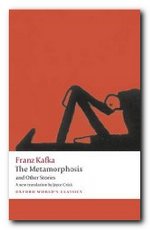 Metamorphosis (1915) is truly one of Kafka’s masterpieces – a stunning parable which lends itself to psychological, sociological, or existential interpretations. It’s the tale of a man who wakes up one morning and finds himself transformed into a giant insect. His family are horrified, gradually disown him, and he dies of neglect, with a rotting apple lodged in his side. Franz Kafka is one of the most important and influential fiction writers of the early twentieth century. He was a novelist and writer of short stories whose works came to be regarded as one of the major achievements of twentieth century literature. Metamorphosis is one of his most stunning and memorable works.
Metamorphosis (1915) is truly one of Kafka’s masterpieces – a stunning parable which lends itself to psychological, sociological, or existential interpretations. It’s the tale of a man who wakes up one morning and finds himself transformed into a giant insect. His family are horrified, gradually disown him, and he dies of neglect, with a rotting apple lodged in his side. Franz Kafka is one of the most important and influential fiction writers of the early twentieth century. He was a novelist and writer of short stories whose works came to be regarded as one of the major achievements of twentieth century literature. Metamorphosis is one of his most stunning and memorable works.
![]() Buy the book at Amazon UK
Buy the book at Amazon UK
![]() Buy the book at Amazon US
Buy the book at Amazon US
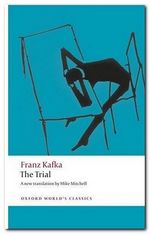 The Trial is Kafka’s one indisputably successful novel – a haunting and original study in existential anxiety, paranoia, and persecution. Joseph K is accused one day of being guilty – but not told what crime he has committed. He wrestles hopelessly with legal officials and a nightmare-like court which acts on arbitrary rules and refuses to give explanations. He spends the entire novel striving to find justice. In the end he fails, only to be killed ‘like a dog’. Kafka gave expression to modern anxiety three decades before most people even started feeling it. This is a novel which stands outside literary norms – a superb achievement of literary modernism. Be prepared for black humour as well as mind-bending contradictions and deeply etched literary expressionism. Read the stories and The Trial as a start and a minimum.
The Trial is Kafka’s one indisputably successful novel – a haunting and original study in existential anxiety, paranoia, and persecution. Joseph K is accused one day of being guilty – but not told what crime he has committed. He wrestles hopelessly with legal officials and a nightmare-like court which acts on arbitrary rules and refuses to give explanations. He spends the entire novel striving to find justice. In the end he fails, only to be killed ‘like a dog’. Kafka gave expression to modern anxiety three decades before most people even started feeling it. This is a novel which stands outside literary norms – a superb achievement of literary modernism. Be prepared for black humour as well as mind-bending contradictions and deeply etched literary expressionism. Read the stories and The Trial as a start and a minimum.
![]() Buy the book at Amazon UK
Buy the book at Amazon UK
![]() Buy the book at Amazon US
Buy the book at Amazon US
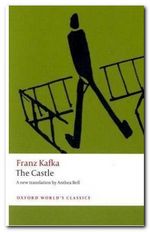 The Castle is Kafka’s last work – a long, rambling, and unfinished novel in which the castle itself operates as a huge metaphor for authority and bureaucracy. If The Trial is about a hopeless search for justice, The Castle is often said to be about the search for grace and forgiveness. The setting is a remote village covered almost permanently in snow and a community fraught with tensions and sexual predators. It lies like a magnificent ruin amongst the many other fragments in Kafka’s oeuvre. This is strictly for the advanced devotee. Tackle this one only when you have read the other shorter works.
The Castle is Kafka’s last work – a long, rambling, and unfinished novel in which the castle itself operates as a huge metaphor for authority and bureaucracy. If The Trial is about a hopeless search for justice, The Castle is often said to be about the search for grace and forgiveness. The setting is a remote village covered almost permanently in snow and a community fraught with tensions and sexual predators. It lies like a magnificent ruin amongst the many other fragments in Kafka’s oeuvre. This is strictly for the advanced devotee. Tackle this one only when you have read the other shorter works.
![]() Buy the book at Amazon UK
Buy the book at Amazon UK
![]() Buy the book at Amazon US
Buy the book at Amazon US
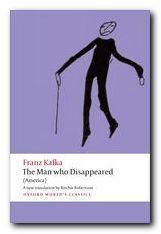 Amerika (also known as The Man who Disappeared) is Kafka’s first attempt at a novel. He is renowned for documenting the horrors of modern life, but Kafka also had a lighter and amusing side. This novel is incomplete, like so much else he wrote. It’s the story of Karl Rossmann who after an embarrassing sexual misadventure is expelled from his European home and goes to live in an imaginary United States (which of course Kafka had never visited). The story is deeply symbolic – as usual – and an interesting supplement to the central texts. In fact it’s a reverse ‘Rags to Riches’ story, because Karl starts his engagement with the American Dream quite successfully – but by the end of the novel he is destitute. The first chapter is frequently anthologised as ‘The Stoker’.
Amerika (also known as The Man who Disappeared) is Kafka’s first attempt at a novel. He is renowned for documenting the horrors of modern life, but Kafka also had a lighter and amusing side. This novel is incomplete, like so much else he wrote. It’s the story of Karl Rossmann who after an embarrassing sexual misadventure is expelled from his European home and goes to live in an imaginary United States (which of course Kafka had never visited). The story is deeply symbolic – as usual – and an interesting supplement to the central texts. In fact it’s a reverse ‘Rags to Riches’ story, because Karl starts his engagement with the American Dream quite successfully – but by the end of the novel he is destitute. The first chapter is frequently anthologised as ‘The Stoker’.
![]() Buy the book at Amazon UK
Buy the book at Amazon UK
![]() Buy the book at Amazon US
Buy the book at Amazon US
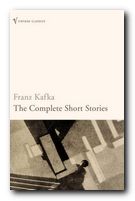 The Complete Short Stories is an amazing bargain, because this includes not only the stories, but also Kafka’s fragments, parables, and sketches. Many of these – although sometimes no more than jottings – contain the germs of ideas and images which Kafka worked up later into his major works. Kafka wrote on the boundaries between fiction and philosophy, and very often he blurrs the distinction between the two.
The Complete Short Stories is an amazing bargain, because this includes not only the stories, but also Kafka’s fragments, parables, and sketches. Many of these – although sometimes no more than jottings – contain the germs of ideas and images which Kafka worked up later into his major works. Kafka wrote on the boundaries between fiction and philosophy, and very often he blurrs the distinction between the two.
![]() Buy the book at Amazon UK
Buy the book at Amazon UK
![]() Buy the book at Amazon US
Buy the book at Amazon US
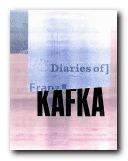 The Diaries Kafka wrote to himself almost as much as he did to other people, and he communicated some of his most subtle and revealing ideas in fragments and notes made in the margins of his tormented life. Here there are the wrestlings with guilt and personal inadequacy, plus the aspirations to a a higher spiritual life. They cover the period from 1910 to 1923 and reveal the inner world in which he lived. He also describes the father he worshipped but feared, and the woman he loved but could not bring himself to marry. It is sometimes difficult to see where his fiction ends and his biographical notes begin, but they form an interesting contrast if they are read in conjunction with the letters and the notebooks. They also need to be read with care, because they conceal almost as much as they reveal.
The Diaries Kafka wrote to himself almost as much as he did to other people, and he communicated some of his most subtle and revealing ideas in fragments and notes made in the margins of his tormented life. Here there are the wrestlings with guilt and personal inadequacy, plus the aspirations to a a higher spiritual life. They cover the period from 1910 to 1923 and reveal the inner world in which he lived. He also describes the father he worshipped but feared, and the woman he loved but could not bring himself to marry. It is sometimes difficult to see where his fiction ends and his biographical notes begin, but they form an interesting contrast if they are read in conjunction with the letters and the notebooks. They also need to be read with care, because they conceal almost as much as they reveal.
![]() Buy the book at Amazon UK
Buy the book at Amazon UK
![]() Buy the book at Amazon US
Buy the book at Amazon US
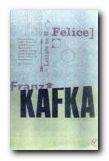 Letters to Felice Many of Kafka’s surviving letters were written to women with whom he was ‘in love’. The qualification of this term is necessary because they reveal a fascinating ambiguity in his attitude to the recipients. Thousands of words are spent analysing his feelings, arranging meetings then cancelling them, deciding to get married and making all the necessary arrangements for where and how to live – and then changing his mind, and writing endless further letters explaining his reasons. Other letters reveal his painstaking sympathy and scrupulous kindness to friends, his neurotic fastidiousness over what most people would regard as trivialities, and his amazing modesty in dealing with other figures of the literary world.
Letters to Felice Many of Kafka’s surviving letters were written to women with whom he was ‘in love’. The qualification of this term is necessary because they reveal a fascinating ambiguity in his attitude to the recipients. Thousands of words are spent analysing his feelings, arranging meetings then cancelling them, deciding to get married and making all the necessary arrangements for where and how to live – and then changing his mind, and writing endless further letters explaining his reasons. Other letters reveal his painstaking sympathy and scrupulous kindness to friends, his neurotic fastidiousness over what most people would regard as trivialities, and his amazing modesty in dealing with other figures of the literary world.
![]() Buy the book at Amazon UK
Buy the book at Amazon UK
![]() Buy the book at Amazon US
Buy the book at Amazon US
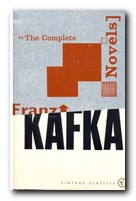 The Complete Novels is a handy, good value compilation which includes Amerika, The Trial, and The Castle. One Amazon reviewer complains that the print is very small, but you can hardly complain when three major works are rolled into one volume of nearly eight hundred pages for less than the price of two cocktails. The translation used is that by Edwin and Willa Muir written in the 1930s.
The Complete Novels is a handy, good value compilation which includes Amerika, The Trial, and The Castle. One Amazon reviewer complains that the print is very small, but you can hardly complain when three major works are rolled into one volume of nearly eight hundred pages for less than the price of two cocktails. The translation used is that by Edwin and Willa Muir written in the 1930s.
![]() Buy the book at Amazon UK
Buy the book at Amazon UK
![]() Buy the book at Amazon US
Buy the book at Amazon US
Franz Kafka – web links
![]() Franz Kafka at Mantex
Franz Kafka at Mantex
Biographical notes, book reviews and study guides on the major works, video presentations and documentaries, adaptations for cinema and television, and links to Kafka archives.
![]() Franz Kafka at Project Gutenberg
Franz Kafka at Project Gutenberg
A major collection of free eTexts in a variety of formats – in both English and German.
![]() Franz Kafka at Wikipedia
Franz Kafka at Wikipedia
Biographical notes, social background, survey of the stories and novels, publishing history, translations, critical interpretation, and extensive bibliographies.
![]() Franz Kafka at the Internet Movie Database
Franz Kafka at the Internet Movie Database
Adaptations for the cinema and television – in various languages. Full details of directors, actors, production features, box office, film reviews, and even quizzes.
![]() Kafka in Love
Kafka in Love
Video photomontage featuring portraits of Kafka, his friends and family, and locations in Prague – with a rather schmaltzy soundtrack in Yiddish and English.
![]() Kafka-Metamorphosis
Kafka-Metamorphosis
A public Wiki dedicated to Kafka and his work, featuring the short stories, interpretations, and further web links.
![]() Kafka Society of America
Kafka Society of America
Academic group with annual meetings and publications. Also features links to other Kafka-related sites
![]() Oxford Kafka Research Centre
Oxford Kafka Research Centre
Academic group based at Oxford University that tracks current research and meetings. [Doesn’t seem to have been updated since 2012.]
![]() The Kafka Project
The Kafka Project
Critical editions and translations of Kafka’s work in several languages, plus articles, literary criticism, bibliographies.
![]() Tribute to Franz Kafka
Tribute to Franz Kafka
Individual fan site (created by ‘Herzogbr’) featuring a collection of texts, reviews, and enthusiast essays. Badly in need of updating, but contains some interesting gems.
![]() Finding Kafka in Prague
Finding Kafka in Prague
Quirky compilation of photos locating Kafka in his home town – with surrealist additions and weird sound track.
![]() Who Owns Kafka?
Who Owns Kafka?
Essay by Judith Butler from the London Review of Books on the contentious issues of ownership of Kafka’s manuscripts where they are currently held in Israel – complete with podcast.
![]() The Kafka Archive – latest news
The Kafka Archive – latest news
Guardian newspaper report on the suitcase full of Kafka and Max Brod’s papers released by Israeli library.
![]() Franz Kafka: an illustrated life
Franz Kafka: an illustrated life
Book review of a charming short biography with some unusual period photos of Kafka and Prague.
© Roy Johnson 2004
More on Franz Kafka
More on the novella
More on literary studies
More on short stories
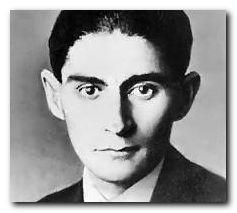
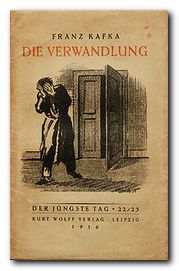 Later, his parents take in lodgers and use Gregor’s room as a dumping area for unwanted objects. Gregor becomes dirty, covered in dust and old bits of rotten food. One day, Gregor hears Grete playing her violin to entertain the lodgers. Gregor is attracted to the music, and slowly walks into the dining room despite himself, entertaining a fantasy of getting his beloved sister to join him in his room and play her violin for him. The lodgers see him and give notice, refusing to pay the rent they owe, even threatening to sue the family for harboring him while they stayed there. Grete determines that the monstrous vermin is no longer Gregor, since Gregor would have left them out of love and taken their burden away. She suggests that they must get rid of it. Gregor retreats to his room and collapses, finally succumbing to his wound, and dying alone.
Later, his parents take in lodgers and use Gregor’s room as a dumping area for unwanted objects. Gregor becomes dirty, covered in dust and old bits of rotten food. One day, Gregor hears Grete playing her violin to entertain the lodgers. Gregor is attracted to the music, and slowly walks into the dining room despite himself, entertaining a fantasy of getting his beloved sister to join him in his room and play her violin for him. The lodgers see him and give notice, refusing to pay the rent they owe, even threatening to sue the family for harboring him while they stayed there. Grete determines that the monstrous vermin is no longer Gregor, since Gregor would have left them out of love and taken their burden away. She suggests that they must get rid of it. Gregor retreats to his room and collapses, finally succumbing to his wound, and dying alone.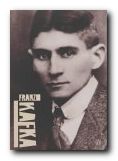 Franz Kafka: Illustrated Life This is a photographic biography that offers an intimate portrait in an attractive format. A lively text is accompanied by over 100 evocative images, many in colour and some previously unpublished. They depict the author’s world – family, friends, and artistic circle in old Prague – together with original book jackets, letters, and other ephemera. This is an excellent starting point for beginners which captures fin de siecle Europe beautifully.
Franz Kafka: Illustrated Life This is a photographic biography that offers an intimate portrait in an attractive format. A lively text is accompanied by over 100 evocative images, many in colour and some previously unpublished. They depict the author’s world – family, friends, and artistic circle in old Prague – together with original book jackets, letters, and other ephemera. This is an excellent starting point for beginners which captures fin de siecle Europe beautifully.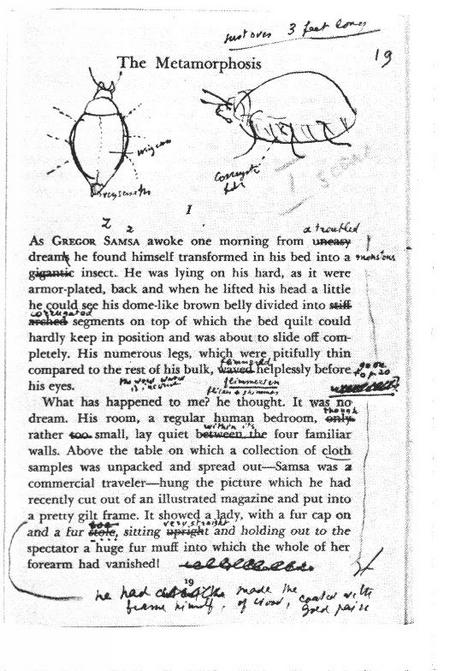
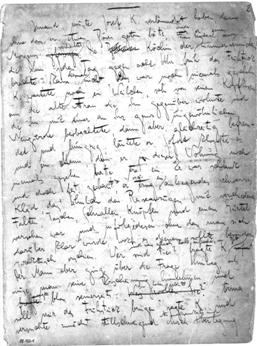

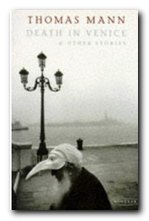 Thomas Mann’s Death in Venice (1912) is a classic novella – half way between a long story and a short novel. It’s a wonderfully condensed tale of the relationship between art and life, love and death. Venice provides the background for the story of a famous German writer who departs from his usual routines, falls in love with a young boy, and gets caught up in a subtle downward spiral of indulgence. The novella is constructed on a framework of references to Greek mythology, and the unity of themes, form, and motifs are superbly realised – even though Mann wrote this when he was quite young. Later in life, Mann was to declare – ‘Nothing in Death in Venice was invented’. The story was turned into a superb film by Luchino Visconti and an opera by Benjamin Britten.
Thomas Mann’s Death in Venice (1912) is a classic novella – half way between a long story and a short novel. It’s a wonderfully condensed tale of the relationship between art and life, love and death. Venice provides the background for the story of a famous German writer who departs from his usual routines, falls in love with a young boy, and gets caught up in a subtle downward spiral of indulgence. The novella is constructed on a framework of references to Greek mythology, and the unity of themes, form, and motifs are superbly realised – even though Mann wrote this when he was quite young. Later in life, Mann was to declare – ‘Nothing in Death in Venice was invented’. The story was turned into a superb film by Luchino Visconti and an opera by Benjamin Britten.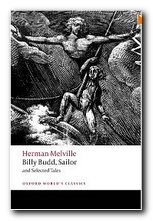 Herman Melville’s novella Billy Budd (1856) deals with a tragic incident at sea, and is based on a true occurence. It is a nautical recasting of the Fall, a parable of good and evil, a meditation on justice and political governance, and a searching portrait of three men caught in a deadly triangle. Billy is the handsome innocent, Claggart his cruel tormentor, and Captain Vere the man who must judge in the conflict between them. The narrative is variously interpreted in Biblical terms, or in terms of representations of male homosexual desire and the mechanisms of prohibition against this desire. His other great novellas Benito Cereno, The Encantadas and Bartelby the Scrivener (all in this collection) show Melville as a master of irony, point-of-view, and tone. These fables ripple out in nearly endless circles of meaning and ambiguities.
Herman Melville’s novella Billy Budd (1856) deals with a tragic incident at sea, and is based on a true occurence. It is a nautical recasting of the Fall, a parable of good and evil, a meditation on justice and political governance, and a searching portrait of three men caught in a deadly triangle. Billy is the handsome innocent, Claggart his cruel tormentor, and Captain Vere the man who must judge in the conflict between them. The narrative is variously interpreted in Biblical terms, or in terms of representations of male homosexual desire and the mechanisms of prohibition against this desire. His other great novellas Benito Cereno, The Encantadas and Bartelby the Scrivener (all in this collection) show Melville as a master of irony, point-of-view, and tone. These fables ripple out in nearly endless circles of meaning and ambiguities. Artistically, the novella is often unified by the use of powerful symbols which hold together the events of the story. The novella requires a very strong sense of form – that is, the shape and essence of what makes it distinct as a literary genre. It is difficult to think of a great novella which has not been written by a great novelist (though Kate Chopin’s The Awakening might be considered an exception). Another curious feature of the novella is that it is almost always very serious. It’s equally difficult to think of a great comic novella – though Saul Bellow’s excellent Seize the Day has some lighter moments.
Artistically, the novella is often unified by the use of powerful symbols which hold together the events of the story. The novella requires a very strong sense of form – that is, the shape and essence of what makes it distinct as a literary genre. It is difficult to think of a great novella which has not been written by a great novelist (though Kate Chopin’s The Awakening might be considered an exception). Another curious feature of the novella is that it is almost always very serious. It’s equally difficult to think of a great comic novella – though Saul Bellow’s excellent Seize the Day has some lighter moments. Seize the Day (1956) focusses on one day in the life of one man, Tommy Wilhelm. A fading charmer who is now separated from his wife and his children, he has reached his day of reckoning and is scared. In his forties, he still retains a boyish impetuousness that has brought him to the brink of havoc. In the course of one climatic day, he reviews his past mistakes and spiritual malaise. Some people might wish to argue that this is a short novel, but it is held together by the sort of concentrated sense of unity which is the hallmark of a novella. It is now generally regarded as the first of Bellow’s great works, even though he went on to write a number of successful and much longer novels – for which he was awarded the Nobel Prize in 1976.
Seize the Day (1956) focusses on one day in the life of one man, Tommy Wilhelm. A fading charmer who is now separated from his wife and his children, he has reached his day of reckoning and is scared. In his forties, he still retains a boyish impetuousness that has brought him to the brink of havoc. In the course of one climatic day, he reviews his past mistakes and spiritual malaise. Some people might wish to argue that this is a short novel, but it is held together by the sort of concentrated sense of unity which is the hallmark of a novella. It is now generally regarded as the first of Bellow’s great works, even though he went on to write a number of successful and much longer novels – for which he was awarded the Nobel Prize in 1976.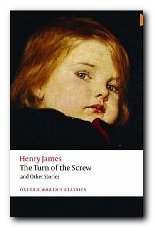 Henry James’ The Turn of the Screw (1897) is a classic novella, and a ghost story which defies easy interpretation. A governess in a remote country house is in charge of two children who appear to be haunted by former employees who are now supposed to be dead. But are they? The story is drenched in complexities – including the central issue of the reliability of the person who is telling the tale. This can be seen as a subtle, self-conscious exploration of the traditional haunted house theme in Victorian culture, filled with echoes of sexual and social unease. Or is it simply, “the most hopelessly evil story that we have ever read”? This collection also includes James’s other ghost stories – Sir Edmund Orme, Owen Wingrave, and The Friends of the Friends.
Henry James’ The Turn of the Screw (1897) is a classic novella, and a ghost story which defies easy interpretation. A governess in a remote country house is in charge of two children who appear to be haunted by former employees who are now supposed to be dead. But are they? The story is drenched in complexities – including the central issue of the reliability of the person who is telling the tale. This can be seen as a subtle, self-conscious exploration of the traditional haunted house theme in Victorian culture, filled with echoes of sexual and social unease. Or is it simply, “the most hopelessly evil story that we have ever read”? This collection also includes James’s other ghost stories – Sir Edmund Orme, Owen Wingrave, and The Friends of the Friends.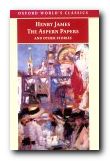 The Aspern Papers (1888) also by Henry James, is a psychological drama set in Venice which centres on the tussle for control of a great writer’s private correspondence. An elderly lady, ex-lover of the writer seeks a husband for her plain niece, whereas the potential purchaser of the letters she possesses is a dedicated bachelor. Money is also at stake – but of course not discussed overtly. There is a refined battle of wills between them. Who wins out? Henry James keeps readers guessing until the very end. The novella is a masterpiece of subtle narration, with an ironic twist in the outcome. This collection of stories also includes The Private Life, The Middle Years, and The Death of the Lion which is another classic novella.
The Aspern Papers (1888) also by Henry James, is a psychological drama set in Venice which centres on the tussle for control of a great writer’s private correspondence. An elderly lady, ex-lover of the writer seeks a husband for her plain niece, whereas the potential purchaser of the letters she possesses is a dedicated bachelor. Money is also at stake – but of course not discussed overtly. There is a refined battle of wills between them. Who wins out? Henry James keeps readers guessing until the very end. The novella is a masterpiece of subtle narration, with an ironic twist in the outcome. This collection of stories also includes The Private Life, The Middle Years, and The Death of the Lion which is another classic novella.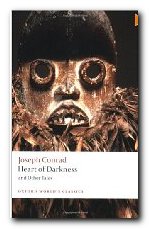 Joseph Conrad’s Heart of Darkness (1902) is a tightly controlled novella which has assumed classic status as an account of late nineteenth century imperialism and the colonial process. It documents the search for a mysterious Kurtz, who has ‘gone too far’ in his exploitation of Africans in the ivory trade. The reader is plunged deeper and deeper into the ‘horrors’ of what happened when Europeans invaded the continent. This might well go down in literary history as Conrad’s finest and most insightful achievement. It is certainly regarded as a classic of the novella form, and a high point of twentieth century literature – even though it was written at its beginning. This volume also contains the story An Outpost of Progress – the magnificent study in shabby cowardice which prefigures ‘Heart of Darkness’. The differences between a story and a novella are readily apparent here if you read both texts and compare them.
Joseph Conrad’s Heart of Darkness (1902) is a tightly controlled novella which has assumed classic status as an account of late nineteenth century imperialism and the colonial process. It documents the search for a mysterious Kurtz, who has ‘gone too far’ in his exploitation of Africans in the ivory trade. The reader is plunged deeper and deeper into the ‘horrors’ of what happened when Europeans invaded the continent. This might well go down in literary history as Conrad’s finest and most insightful achievement. It is certainly regarded as a classic of the novella form, and a high point of twentieth century literature – even though it was written at its beginning. This volume also contains the story An Outpost of Progress – the magnificent study in shabby cowardice which prefigures ‘Heart of Darkness’. The differences between a story and a novella are readily apparent here if you read both texts and compare them.